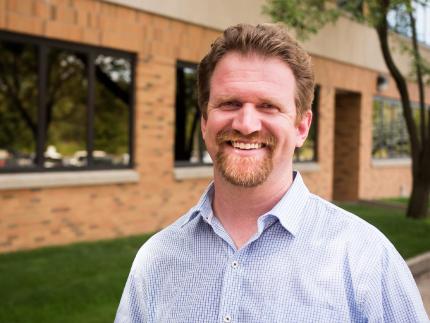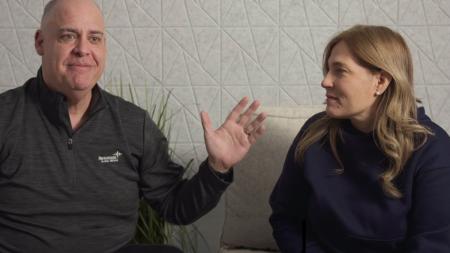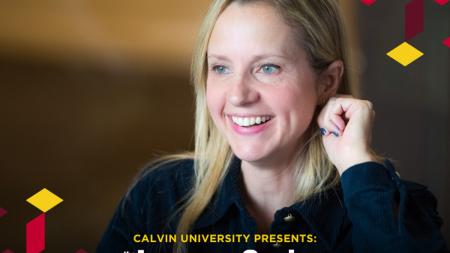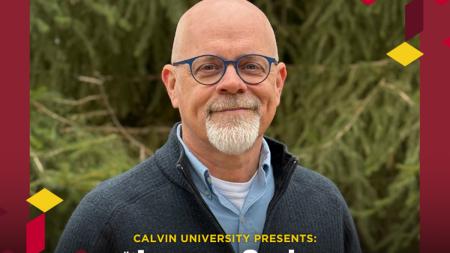On the Road of Rebuilding and Renewal

Greetings. My name is Zachary King, and I serve as general secretary of the Christian Reformed Church in North America. This evening I have the pleasure of sharing this reflection on the state of the Christian Reformed Church with you.
We tend to like simple stories where things go in one direction – “and they lived happily ever after.” This phrase made its first appearance in 18th century literature and was subsequently adopted in fairy tales, children’s movies, and romantic comedies. But the real world is much more complicated.
Eight years ago, after 20 years of living in rental properties and parsonages on the mission field and in North America, I bought my first house – a blue, two-story home with a two-car garage and a walkout basement on half an acre in Kentwood, Michigan. Don’t get me wrong, I’ve enjoyed owning. But it hasn’t been “happily ever after.”
I’ve replaced the furnace (and probably will have to do the A/C next year). I’ve put on new gutters, added bathroom exhaust fans, pulled out dying bushes, cut down blighted trees, and fixed innumerable toilets and sinks. I think I’ve replaced 20 electric outlets and a handful of light fixtures. Just a few weeks ago, I was on a ladder on top of my garage roof reattaching a huge piece of molding that blew off in a spring windstorm. Only by God’s grace did I survive that repair.
Isn't it strange that we seem to have the expectation that when it comes to home ownership and ministry, it will be, as they say in the movie business, “happily ever after”? Why do we think that? Doesn’t the Holy Spirit convict us, discipline us, and reform us? Doesn’t God use persecution and adversity to shape us? Don’t we have to die to ourselves in order to rise with Christ? We want ministry to be simple. The real world is much more complicated.
A great biblical example of this complexity is the laying of the foundation of the Second Jerusalem Temple in 536 B.C. as described in Ezra 3:10-13. The armies of Babylon deported many of Jerusalem’s leaders and destroyed much of the city along with Solomon’s temple in 586 B.C. After fifty years, Cyrus the Great, King of Persia, allowed a group of Jewish exiles to return and rebuild the temple. Let’s listen to the words of Ezra 3:10-13:
“When the builders laid the foundation of the temple of the LORD, the priests in their vestments and with trumpets, and the Levites (the sons of Asaph) with cymbals, took their places to praise the LORD, as prescribed by David king of Israel. With praise and thanksgiving they sang to the LORD: “He is good; His love toward Israel endures forever.” And all the people gave a great shout of praise to the LORD, because the foundation of the house of the LORD was laid. But many of the older priests and Levites and family heads, who had seen the former temple, wept aloud when they saw the foundation of this temple being laid, while many others shouted for joy. No one could distinguish the sound of the shouts of joy from the sound of weeping, because the people made so much noise. And the sound was heard far away.”
The laying of the temple’s foundation sparked contradictory emotions: thanksgiving and sadness, hope and lament. It certainly was not a “happily ever after” moment. The temple builders would have to endure twenty years of hard work and opposition before completing it. But it was a major step on the road to the renewal and rebuilding of God’s people.
As congregations, classes, agencies, institutions – as a denomination – we also are on that road. The Emmaus travelers, about whom we are going to hear so much during Synod 2025, were on that road. For the rest of this address, I want to talk about four “stages” on God’s road of rebuilding and renewing the CRCNA for our ministry and mission in our communities and around the world.
For God’s covenant people, the first stage of the journey to renewal and rebuilding is to recognize where we have been. As a community of churches, God has embraced us with his covenant faithfulness from the very beginning.
In Ezra 3, the recognition of God’s covenant faithfulness comes in the words of the song of the priests and Levites in verse 11, “The LORD is good, his love toward Israel endures forever.” These words echo the refrain of praise in 1 Chron. 16, and in Psalms 106, 107, 118, and in Psalm 136, “Give thanks to the LORD, for he is good; his love endures forever.”
The Hebrew term for God’s love in Ezra 3:11 is hesed, a term used in the Old Testament to refer to God’s enduring love based on his covenant promises to Israel. From the calling of Abram, through the patriarchs, the Exodus, the judges, the kings, the prophets, and the exile, the people of Israel had always been surrounded by God’s loving covenant promises. Remembering God’s faithful love is a foundational spiritual discipline that frames the way we think about present and future. So let’s do that now.
While the first CRC congregation in Canada was located in southern Alberta, First CRC of Chatham, the convening church of Synod 2025, is the first congregation in Ontario. In 1925 the Rev. J.R. Brink of Grand Rapids, Mich., came to Chatham to minister to a small group of Dutch immigrants from diverse backgrounds. At first, Rev. Brink led worship in Dutch for approximately 50 souls.
The Great Depression and World War II were difficult for this small congregation, but the support of Oakdale Park CRC in Grand Rapids prepared it to receive a postwar wave of Dutch immigrants beginning in 1947. As membership roles grew, First CRC members traveled as far as Nova Scotia to enfold new Dutch immigrants arriving in Canada.
By 1959, First CRC counted 190 families among its membership. Today First CRC of Chatham continues to share hospitality and welcome with new immigrants to Canada. And we thank them for being the convening church and host for this year’s synod.
In another look back, we can consider some of the institutions that we, as a denomination, have started over the years. Since 1876, Calvin Theological Seminary and Calvin University have stood as beacons of Christ's promise to renew all things. Founded by the Christian Reformed Church leaders in Grand Rapids as a place to train future ministers and beginning with only seven initial students, these institutions have evolved from humble beginnings into globally recognized centers of Reformed education.
Calvin University has emerged as a premier Christian higher education institution, integrating faith and learning to equip students worldwide to think deeply, act justly, and live wholeheartedly in every sphere and sector. Meanwhile, Calvin Theological Seminary has grown into a leader in whole-person education, preparing highly trained pastors and leaders to serve in the Christian Reformed Church and beyond.
Together, we celebrate 150 years of shared heritage rooted in deep faith and commitment to God's work. Both institutions are dedicated to nurturing minds and hearts for the glory of God's kingdom.
In 2027 we will be celebrating the 170-year anniversary of the CRCNA denomination. In 1857, a very small and struggling community of congregations began near Holland, Mich. And as we can see today, God has maintained his covenant love to our denomination through the generations. Since 2018, we’ve also been blessed to be able to take time at synod to celebrate the 150th anniversaries of 20 congregations. This year, the 21st of those churches joins in reaching that milestone – Kelloggsville CRC of Kentwood, Mich.
Kelloggsville CRC began in 1875 with 13 families. Over the years they’ve faced trials. Their initial building burned down. They’ve had losses. But they’ve also grown, planted new CRC congregations, started community programs, and celebrated countless baptisms, professions of faith, and other milestones. They turn 150 this year, and I’d like to ask you to help us acknowledge God’s faithfulness with and through them.
There is so much to be thankful for as we reflect on God’s faithfulness through the decades and centuries. But, as we think of the future of our churches, it is important to take account of where we are now. The road to renewal and rebuilding of our churches and ministries must pass through this present moment.
Ezra 3:10-13 recounts the laying of the foundation of the second temple in Jerusalem. But on the day when the trumpets blew on the temple mount in recognition of the laying of the first foundation stones, life was tenuous for both the exiles and the Jews who remained. Seventy years after the first Babylonian deportation and fifty years after Jerusalem’s sacking, the rubble of the past surrounded them.
Although many homes had been rebuilt, Jerusalem’s wall remained broken down, Solomon’s palace and the first temple were in rubble, and the people were afraid of their neighbors. Into this moment God called Zerubbabel, the grandson of king Jehoiachin, and Joshua, son of Jehozadak, the high priest, to rebuild the temple and to reestablish the offerings and worship of the Lord.
How difficult it must have been for Zerubbabel, Joshua, and the inhabitants of Jerusalem to start over. Yet there was evidence of God’s faithfulness. Exiles were returning to Jerusalem as Jeremiah, Daniel, and other prophets had foretold. Cyrus the Great, the Persian king, provided items for the rebuilding like silver, gold, cattle, and even the old furnishings of the Temple that Babylonians had pillaged. This wasn’t exactly “happily ever after,” but this was a big step on the road to renewal and rebuilding.
When we consider where we are currently as a denomination, the phrase “happily ever after” probably doesn’t come to mind. It has been a challenging three years for our community of churches as we’ve debated our position on human sexuality and defined the boundaries of belief and behavior around it.
Right now, 34 churches have disaffiliated or are in the process of disaffiliating from the CRCNA. Most of them have left our denomination because of these synodical decisions and their implementation. In the midst of this, many of our churches face the post-COVID realities of declining attendance, along with cultural headwinds that have made ministry in North America challenging.
Without a doubt, the context was challenging for Zerubbabel and Joshua as well when they arrived in Jerusalem to begin the work of rebuilding and renewal. In the same way, God is rebuilding and renewing the ministries and congregations of the CRCNA.
What gives me the confidence to say that? Because we can trust in God’s faithful covenant love, the love that prompted exiles and psalmists to sing: “His love toward Israel endures forever.” God is renewing and rebuilding the CRCNA for its ministry and mission in our communities and around the world.
A great example of what rebuilding and renewal looks like is happening presently in the Brightmoor neighborhood of Detroit, Mich. Once the beating heart of North American manufacturing, Detroit now has hundreds of residential blocks of abandoned homes and empty lots due to decades of disinvestment by former residents, the government, and businesses.
But God is renewing several of those blocks through the ministry of Hesed Community Church, a ministry partnership between the CRCNA and the Reformed Church in America. Pastor Mark Van Andel and his colleagues share the gospel, worship together, and disciple residents every day.
At Hesed facilities, community members can participate in Bible studies, discipleship, and mentoring while they do their laundry or eat a warm meal. In a neighborhood where people often live in abandoned and unsafe housing, Hesed has purchased 10 homes to provide safe shelter for residents. When violence rocks the neighborhood, Hesed members come together to comfort and pray for one another and for their community.
God displays his covenant love, expressed by the Hebrew term hesed in Ezra 3, every day in this beautiful partnership between the churches of Classis Lake Erie, Resonate Global Mission, the RCA, and the members and residents of Hesed’s community. If you want to hear the story of Hesed Community Church, check out this video produced for a recent Gather event. God is renewing and rebuilding the CRCNA for ministry and mission in North America and around the world.
God has been faithful in our history, and, despite everything that we’ve gone through, God has prepared us for this present moment. But the next steps require us to recognize where God is leading us in the future.
Ezra 3 reminds us that laying a foundation is an act of faith and trust in God who guides the future. It was so for Zerubbabel and Joshua. With the wreckage of the former temple cleared away, the workers organized, and the stone and lumber gathered, that moment of faith arrived.
As the foundation stones fell into place, according to Ezra 3:10-13 trumpets sounded, cymbals clashed, and everyone began to sing, “The LORD is good, his love toward Israel endures forever.” Then a strange thing happened. The older priests, Levites, and family heads who had seen Solomon’s temple before its destruction by the Babylonian armies began to weep. The younger generation who had grown up in exile shouted and praised God with exuberant thanksgiving. All the singing and the shouting and the crying was so loud that no one could distinguish one from the other.
Why were some weeping and others shouting for joy? In Haggai 2:3 we learn that the new temple was much smaller than the former temple. And in Zechariah 4:10 the exiles are warned not “to despise the day of small things” with regard to the new temple foundation laid by Zerubbabel.
Though the new temple was small, the laying of its foundations was a milestone on the journey of God’s faithful love and a fulfillment of the prophecy of Jeremiah 25 that the exiles would return and rebuild. In the laying of the temple’s foundations, Ezra, Haggai, and Zechariah all saw that God was guiding his people into a time of renewal and rebuilding. But to the untrained eye this work seemed small.
In the same way, despite what might appear to some as reduction and loss, God is leading the CRCNA on the road of renewal and rebuilding for mission and ministry as we move into the future.
One of the greatest stories of how God is renewing and rebuilding congregations for the future comes from our own Classis Red Mesa. For decades, it was difficult for the majority of the classis’ small congregations situated in the beautiful but relatively isolated areas of northwestern New Mexico and northeastern Arizona to call and retain pastors. Housing is difficult as well, since some of the parsonages have asbestos insulation and lack dependable utilities, including running water.
In response, the classis initiated a Leadership Development Network. The network began training both younger and older leaders in theology, biblical interpretation, and ministry skills. After many years of training, the pulpits of Red Mesa congregations are mostly filled with ministers, commissioned pastors, and trained lay leaders. These leaders love their congregations, know their local contexts, and make great sacrifices (including a lot of driving) to nurture their flocks.
God’s provision for leaders in Classis Red Mesa is not a simple “happily ever after” story. Things are still hard, and there are big concerns as a generation of leaders enter the autumn season of life and younger leaders seem to be in short supply. But God is laying a foundation, just as he did with Zerubbabel and Joshua.
We know that, as a denomination, we too are crying out for God to raise up church leaders. At Synod 2024, our Candidacy director, Rev. Susan LaClear, shared the research of the Candidacy Committee about the availability of pastors and the need for local congregations and classes to nourish and disciple potential leaders. This is a critical calling.
I am amazed by the stories about God raising up leaders for his harvest fields. For one church, renewal of leadership looks like a 23 year-old head Cadet Counselor leading a thriving outreach to boys in the community. In another congregation it looks like a retired schoolteacher who, on her own initiative, developed a group to disciple middle school girls after they aged out of the Gems program.
In one of our CRCNA classes from which churches have disaffiliated, God’s work of rebuilding and renewal looks like the celebration of the ordination of two commissioned pastors who are currently incarcerated, along with the emergence of a church plant as an established congregation. These are not necessarily “happily ever after” stories, but they demonstrate God’s active work with and through us even today.
At the 10 Gather events that were held over the past 18 months, we heard numerous such stories about God showing up, surprising us with his faithfulness, and using ordinary people and programs to do extraordinary things. Take time at some point during this week to read the cards on display near the cafeteria. Each of these were written by Gather participants, and they include stories of where God has done incredible things.
We don’t have time to share all of those stories today, but I encourage you to read those cards and also to visit crcna.org/gather and to watch some of the video stories that were captured. I think you’ll be inspired by what you find – stories of churches maintaining a long-term faithful presence in their local community and how that has made a difference, stories of new churches and new growth among immigrant populations, stories of creative solutions when small churches didn’t have the resources to do everything they wanted to do on their own, and stories of intercultural collaboration and the joys that have resulted.
These stories and examples remind us that although nothing in this life ends “happily ever after,” God is indeed leading us into a hopeful future of ministry and mission rooted in his faithful covenant love.
We’ve spent some time today reflecting on the road of renewal and rebuilding on which God is leading us. This is, if you will, the Emmaus road that the churches of our denomination will take together. We’ve taken some time to recognize where we’ve been, to recognize where we are, and to recognize where we are going. I’d like to spend the final few minutes of this speech to reflect on how we are going to walk on this road of renewal and rebuilding.
There is a beautiful parallel account of Ezra 3:10-13 in Haggai 2. Haggai 2 reminds us that things didn’t go “happily ever after.” In the midst of Zerubbabel and Joshua’s struggles to rebuild the temple, Haggai shared a prophetic message of encouragement from the Lord: “‘But now be strong, Zerubbabel,’ declares the LORD. ‘Be strong, Joshua son of Jehozadak, the high priest. Be strong, all you people of the land,’ declares the LORD, ‘and work. For I am with you,’ declares the LORD Almighty. ‘This is what I covenanted with you when you came out of Egypt. And my Spirit remains among you. Do not fear.’”
Nearly two decades of opposition, starting, stopping, and restarting lay ahead before the temple would be completed in 516 B.C. How would Zerubbabel, Joshua, and the rest of the exiles walk that road of rebuilding and renewal? They would be strong and work in the power of the Lord who was with them.
Just as it was for the exiles, the road to renewal and rebuilding in the CRCNA is not going to be easy; it’s not going to be “happily ever after.” There will be opposition, starting, stopping, and restarting. We have an enemy who would like nothing better than to discourage us, divide us, and compromise our witness. How are we going to walk along the road? God is calling us to be strong and to work in the power of the Lord who is with us.
One of the wonderful stories of being strong and working with the Spirit of the Lord comes from the congregation of Hebron CRC of Whitby, Ont. Hebron’s story is one of a long journey of rebuilding and renewal. Sixty five years ago, that journey began as a congregation of recent Dutch immigrants to Canada who came to rebuild and renew congregations, homes, businesses, and livelihoods on unfamiliar soil. Today the congregation of Hebron CRC has welcomed Chinese immigrants who are renewing and rebuilding their lives in the Whitby community. Hebron’s CRC’s story is available here.
Many of us at Synod 2025 will be familiar with parts of Hebron CRC’s story as our own congregations have been welcoming and growing with diverse ethnic groups who are present in our communities and congregations. In Canada, the CRCNA has launched an intercultural cohort through Thrive and the Canadian Justice Ministries to assist churches that are becoming increasingly ethnically diverse.
As we think about walking the path of renewal and rebuilding in the strength of the Lord, I would like to remind us all about the four milestones of a journey that we have set out on as a community of churches, the Our Journey Ministry Plan. Five years ago, CRCNA classes and congregations provided the feedback that shaped the Our Journey Ministry Plan.
Today this plan represents the vision of renewal and rebuilding that God placed on our hearts for a time such as this. On our journey of renewal and rebuilding, God is cultivating in us habits of prayer and spiritual practices, transforming our lives and communities by the power of the Holy Spirit. On our journey of rebuilding and renewal God is helping us listen to the voices of every generation, shaping us for ministry together. On our journey of rebuilding and renewal, God is growing us in diversity and unity by seeking justice, reconciliation, and welcome, sharing our faith as we build relationships with our neighbors and newcomers. On our journey of rebuilding and renewal, God is helping us share the gospel, live it missionally, and plant new churches in our neighborhoods.
More information about the Ministry Plan is available at crcna.org/OurJourney, including links to reach out to staff who can support your congregation’s journey. God is renewing and rebuilding the CRCNA for his ministry and mission in our communities and around the world.
What does that road of renewal and rebuilding look like for our congregations, for our classes, for our agencies and institutions, and for our denomination? It won’t be a “happily ever after” romantic comedy or fairy tale. It very likely will be full of starting, struggling, and restarting again. It may be that as God lays a renewed foundation, we may both lament, because it isn’t what we expected, and rejoice, because it’s so much better.
Maybe we will need to take Zechariah’s advice not to “despise the day” of small beginnings. God is renewing and rebuilding us for his ministry and mission in our communities and around the world. That’s what God did; that’s what he is doing; and that’s what he will continue to do.
So I want to leave you with Haggai’s word to the exiles: “But now be strong, Zerubbabel,’ declares the LORD. ‘Be strong, Joshua son of Jehozadak, the high priest. Be strong, all you people of the land,’ declares the LORD, ‘and work. For I am with you,’ declares the LORD Almighty. ‘This is what I covenanted with you when you came out of Egypt. And my Spirit remains among you. Do not fear.’” Be strong and work, be strong and walk, for the Lord your God goes with you on the journey of rebuilding and renewal.


